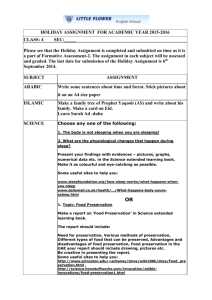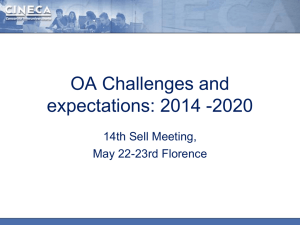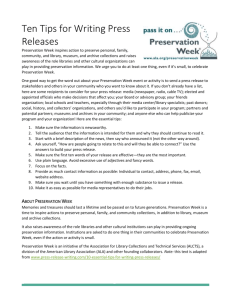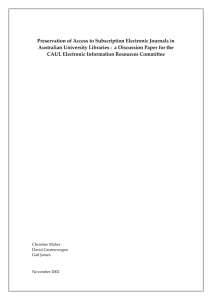DOC - Europa
advertisement
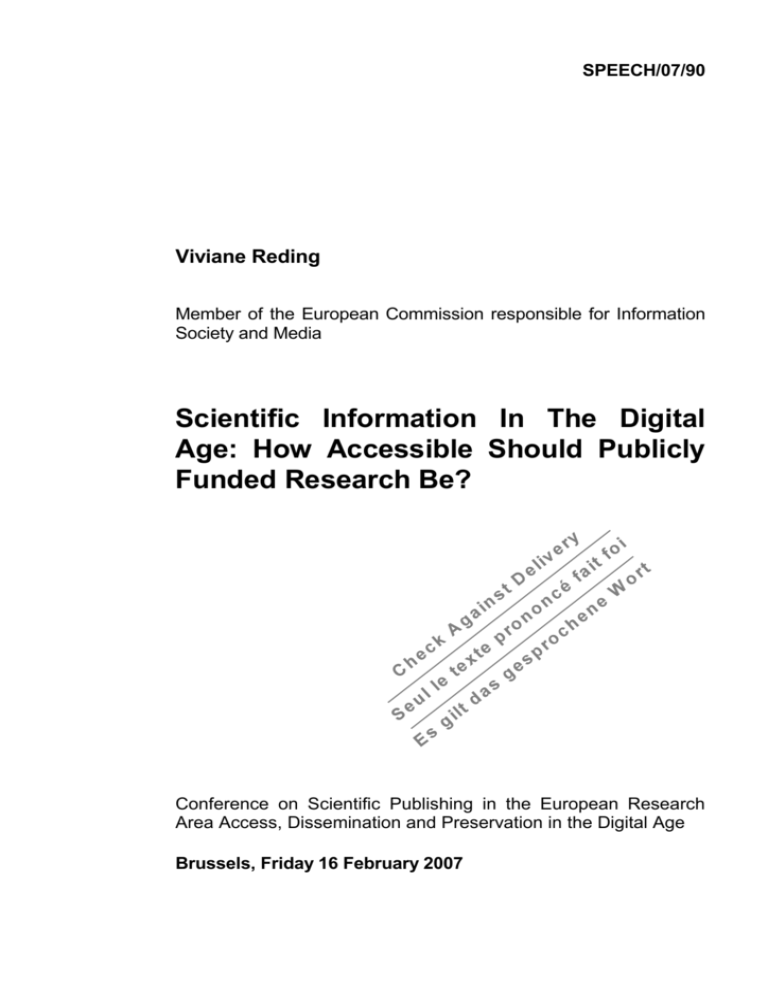
SPEECH/07/90 Viviane Reding Member of the European Commission responsible for Information Society and Media Scientific Information In The Digital Age: How Accessible Should Publicly Funded Research Be? Conference on Scientific Publishing in the European Research Area Access, Dissemination and Preservation in the Digital Age Brussels, Friday 16 February 2007 Ladies and gentlemen, We have come to the end of a constructive conference. You have considered a set of issues relevant for scientific publishing, ranging from new business models to copyrights and digital preservation. I understood that in several sessions the debate has been lively, or even passionate. Why is this issue important? - Before drawing some conclusions and indicating avenues for the future, let me first take a step back. Let me say a few words on why this topic is so important for Europe. - The transition from the Roman Empire to the dark Middle-Ages was a painful one for society and for science. Masses of knowledge got lost and standards of living dropped dramatically. Scientific progress stopped. This was not because people had suddenly become less intelligent. One reason was that they simply had no longer access to and could no longer build on knowledge that was once the state of the art. - This example shows two key points: in the first place the impact of collective knowledge on the economy and quality of life; in the second place the necessity of accessing and spreading this knowledge for making progress. I could rephrase this: scientific information systems underpin scientific progress, which in turn has a huge effect on our economy and on our way of life. This has not changed over time. ICT and scientific publishing - So let's come back to the digital age. Improving the access to and the use of information is one of the key themes of i2010, the European Commission strategy for the information society. This theme cuts across the three pillars of the i2010 initiative: - fostering a common European information space; - strengthening ICT research and its deployment in Europe; and - the promotion of an inclusive information society. - When it comes to the use of the new information and communication tools, scientific publishers and the scientific community at large have been at the forefront. They have made early investments in new technologies to distribute information and make it more accessible. At present some 90% of scientific journal articles are accessible online (in most cases along with a paper version). According to a study for the British Library, 90% of all articles will only be available online by 2020. Many older issues of scientific journals have been digitised to make them accessible in the digital environment. - The question is: can we ensure a wide and rapid dissemination of research results, while maintaining the highest standards of quality? I believe so. 2 Open access experiments - For over 100 years, scientific journals have been a main vehicle for the dissemination of research results. Journals were produced by publishers and charged for under subscription models. Over the last few years, we have seen the development of alternative business models that guarantee free access to journal articles for all, from the moment of publication. In these models, it is the organisation that funds the research that pays for the publication costs, and not the readers of the journal. The experiments have been carried out by new entrants in the market such as Public library of science and Biomed Central, but also by more traditional actors such as Springer Verlag or Oxford University Press. The idea is that by making articles freely accessible on the internet, they will be used more and will therefore have a higher impact. - In parallel, scientific institutions and research communities are setting up digital repositories in which they collect the output of their researchers, sometimes in combination with the experimental data. Some funding bodies have started requiring from their researchers that they deposit their research output in open repositories, accessible to all. A heated debate - These developments have led to an intense and often polarised debate between the stakeholders on access policies. Let's have a look at the arguments used by both sides. Those that support open access are using roughly the following arguments: - Free access to all scientific information through the Internet will benefit the scientific system and make it more efficient. - The public purse pays three times: for producing the results and writing the article; for the peer-review by professors; and for buying the results through libraries. Therefore the public sector should have a bigger say in the system and not just rely on rules dictated by the publishers. - Prices have gone up so much over the last years that there is an access problem. - The publishers put forward a number of counter-arguments: - Publishing has a cost and someone has to bear it. The 'no-one pays' model does not exist. - Publishers have made the system more efficient with the new ICT tools and access to information has greatly improved. - The third key argument is related to the peer review system. At present results are consolidated in articles which are then submitted to colleagues for a thorough check. Changing the present model could put at risk this well working peer review system. - The key question in all this seems to be: how to combine a rapid and wide dissemination of validated results with a fair remuneration for those who make investments to make the system work? 3 - As usual, the devil is in the detail. What is a fair remuneration and what is an embargo period that makes a fair remuneration possible? There is a need for a continued and constructive debate on these issues. Through the High level group on digital libraries, I intend to contribute personally to the aim of bringing stakeholders closer together on the most controversial issues. Towards a better use of research data - Much of the discussion in the last two days has focused on scientific journals. But there is more. Also other developments have been discussed, for example the new opportunities to make better use of research data. - An example of the impact of ICT on the use of data is the biological scientific domain. Computer automated scientific techniques have dramatically enhanced scientists' ability to sequence DNA and identify proteins. In fact, it is reported that the cost of sequencing DNA has fallen 1.000 times since 1990. - The use and re-use of scientific data through applications such as data-mining, as well as possibilities to combine journal articles with the underlying research data is gaining importance in many scientific disciplines. And it is generally believed that this kind of application has an enormous potential for the future. Indeed, we can already see a trend towards a continuum of the scientific information space, from data to publications. - For this development digital repositories with scientific material, filled by research institutions or research communities, have a strategic value. Repositories can also be instrumental in fostering collaboration between research teams in different locations. With an e-infrastructure of networked digital repositories, experimental data can be processed simultaneously by various scientists in different sites. Within this context, I would like to underline the efforts of initiatives such as GÉANT and EGEE (the Enabling Grids for EsciencE) (which are world-leading infrastructures for very high speed transmissions and analysis of data). They provide advanced platforms linking European research communities among themselves, and with the rest of the world. Digital preservation - Another area where the new ICT tools have brought enormous changes is the preservation of digital information. This is one of the key issues within the digital libraries initiative, which is reflected in the Commission Communication on scientific information in the digital age. - If you look at it from the preservation point of view, the 'old technologies' were amazingly efficient. Take the example of clay-tablets. They easily lasted for thousands of years. Paper is not so bad either, lasting a few hundreds of years. In comparison, digital information is highly unstable. Hardware, software and standard formats change very rapidly, which can make the information unreadable after just a few years. And storage devises (such as CD-ROMs) have also a limited lifetime. - We need to actively preserve digital material to prevent it from being lost for future generations and to keep it accessible and usable over time. This is a topic that goes far beyond the realm of scientific information and is relevant to any organisation producing or processing and achieving information. 4 - Within the framework of the digital libraries initiative, I have started working on this topic with the Ministers responsible for culture. This was done on the basis of a Recommendation that the European Commission adopted in August 2006. The EU Ministers have responded in November last year with favourable Council conclusions. They have agreed – amongst other things – that there is a need for clear national preservation strategies for digital information. - It is essential that also the scientific community becomes fully aware of what is at stake. Data and publications from the past are relevant in all scientific disciplines and sometimes take their importance only in the light of new knowledge. To take just one example: studies on climate change are highly dependent on observations done over the centuries. - At present responsibilities on who decides what to preserve, who does the actual preservation, and who pays for it are not clearly defined across the European Union. Legal deposit laws are being updated in most Member States to take into account digital material and not just books and journals; yet that is, in itself, not enough. Within 50 years, we may have lost relevant information or need to do very costly recovery work that could have been prevented. - So if we do not actively pursue the preservation of digital material now, we risk having a gap in our intellectual record. - If you allow me another historical reference, we do not want to experience the digital equivalent of the destruction of the Alexandria Library. Scientific assets are just too valuable to be put at risk. Situation in the different Member States varies widely - It must be said that the situation is far from homogeneous across the European Union and that Member States are moving at different speeds. This is true for the issue of digital preservation, but also for experiments with open access and the development of infrastructures for e-science. - That is why the Commission wants to start a discussion with the EU Ministers responsible for these issues, as well as with the European Parliament. I believe the Commission Communication on scientific information in the digital age provides a good basis for this discussion. Given the international character of scientific information flows, the interests at stake and the differences between Member States, it seems logical to work towards a common European approach. What will the Commission do? - The Commission acts in this debate as a policy maker but of course it also wears another hat. The Commission is a major funding body for scientific research in Europe. In the period 2007-2013, the EU will invest some 50 billion euro through the 7th framework programme for research and development alone. 5 - We are a stakeholder and as such we have the duty to show the way. We think that, in principle, results of publicly funded research should be accessible to all after a certain period. That has a consequence for the way in which we deal with the issue within our own programmes: in the coming few years, the Commission will experiment measures that make a faster and wider access to the information possible. For example, costs for 'author pays' publishing will be allowable costs under our grant agreements. And in specific programmes, we will even experiment the deposit of articles based on Community funded research in an open repository, after an embargo period. - At the same time we will fund the deployment of modern infrastructures that will allow researchers to store and share data resulting from their observations and experiments. Through the capacities programme - which is part of the 7th Framework programme for R&D - the Commission will dedicate some 50 million euro in the coming 2 years in order to build up a top-level data infrastructure. - Research on digital preservation will also be enhanced, and some 25 million euro has been earmarked to this end within the ICT-programme for the years 2007 and 2008. 10 more million euro will be dedicated to a better accessibility and usability of scientific information through the eContentplus programme. - The Commission will also take a more pro-active role in the discussions between stakeholders and try to bring them closer together. One forum for these discussions is the High level group on digital libraries, where I listen to all views with the greatest attention. - My portfolio as Commissioner for the information society and media encompasses research activities as well as the publishing industries. So you can count on me for taking all interests in the debate duly into account. Conclusion Ladies and gentlemen, Europe needs a rapid and widespread accessibility of scientific information while maintaining the highest quality. That should be our common goal. - The present conference has been a good occasion to discuss the underlying issues and to listen to each other's arguments. Let us now move forward and try to get to workable solutions. - It should be possible to build on Europe's strong tradition in scientific publishing to grasp the opportunities of the information society for achieving a better access to scientific information and for innovative ways to add value. - In our discussions about the present situation and about the near future we should not forget the long term perspective. We should work towards efficient ways to preserve scientific information (publications and relevant data) and enable future generations of researchers to build on the excellent work that is done today. - The Commission will fully play its part to support the scientific community and industry in this period of intense change, to tackle the issue of digital preservation, and to arrive at a shared vision in Europe for scientific information in the digital age. 6

